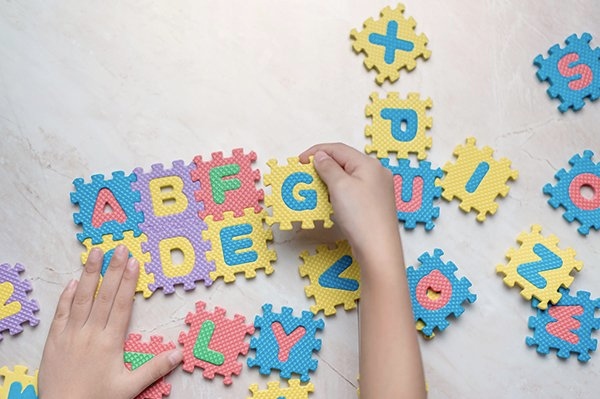Are you looking for ways to support your preschooler’s literacy development? Literacy activities for preschoolers are essential for building foundational skills in reading and writing, which are crucial for their future academic success.
Math & ELA | PreK To Grade 5
Kids see fun.
You see real learning outcomes.
Watch your kids fall in love with math & reading through our scientifically designed curriculum.
Parents, try for free Teachers, use for free
This blog will cover what literacy skills entail for preschoolers, outline the benefits of engaging them in language and literacy activities, and provide practical activities to enhance their learning.
1. Sound Jump
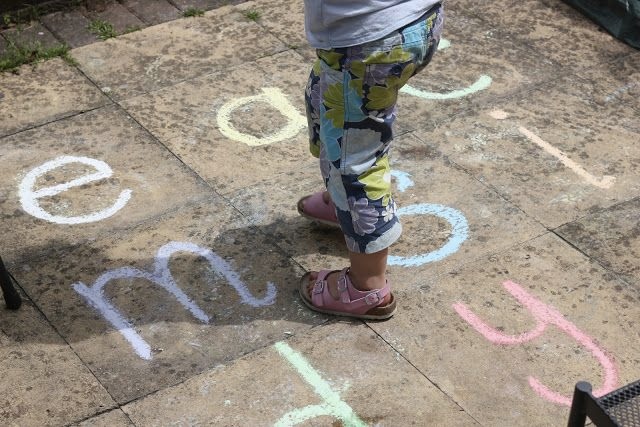
Sound Jump is a dynamic way to blend physical activity with language literacy activities for preschoolers. To set up, place letters on the floor, either using paper cutouts or letter mats. Call out different sounds, and have the children jump to the letter that corresponds with the sound you made. This activity not only helps with phonics and letter recognition but also keeps learning active and enjoyable, making it a perfect blend of movement and education.
Related Reading: How to Teach Phonics to Kids
2. Mad Libs
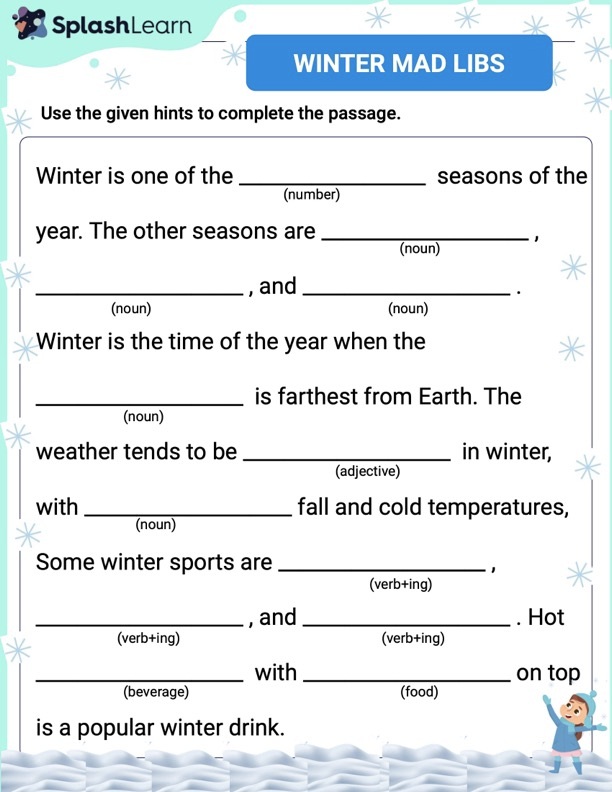
Mad Libs offer a creative approach to learning parts of speech, making them a hit among language activities for preschoolers. Start with a simple story that has blanks for nouns, verbs, adjectives, etc. Ask the children to provide random words to fill in these blanks, and then read the story aloud. The humorous outcomes not only engage the children but also teach them about parts of speech in a context that’s fun and memorable.
Get started with this printable mad lib:
Related Reading: Best Reading Comprehension Activities for Kids
3. Word Search Puzzles
Word search puzzles are excellent tools for reinforcing vocabulary and spelling in an engaging way, making them a great choice for preschool language activities. Create puzzles that focus on a theme or a set of vocabulary words the child is currently learning. This activity not only aids in pattern recognition but also enhances spelling skills as children look for words within the grid. It’s a quiet, focused activity that can complement the more active games in your literacy toolkit.
Start with these fun word search worksheets:
4. Word Jumble
Word Jumble is a playful challenge that supports literacy for preschoolers by encouraging them to manipulate letters to form words. Present a set of jumbled letters to the children and ask them to rearrange them to create a word. For younger preschoolers, opt for shorter words or provide a visual hint to guide them. This activity not only enhances their understanding of word structure but also improves their spelling skills, making it a fun and educational task.
5. Crossword Puzzles for Kids
Crossword puzzles can be tailored as preschool language art activities, designed with simple words and clues that match the children’s vocabulary level. Creating or finding age-appropriate crossword puzzles encourages children to think about words and their meanings, promoting their vocabulary development. As they work to fill in the blanks, they practice spelling and learn new words, making crosswords a valuable addition to pre k literacy activities.
6. Interactive Reading
Interactive Reading transforms storytime into an active learning experience, crucial for fostering literacy in preschoolers. As you read a story, pause to ask questions about the plot, predict what might happen next, and discuss the characters’ actions. This method not only improves listening and comprehension skills but also encourages children to think critically about the story. Incorporating interactive reading into your routine supports a deeper engagement with books, laying a strong foundation for lifelong reading habits.
7. Letter Matching
The Letter Matching is a fundamental literacy activity for preschoolers that combines learning with play. In this activity, children then match the letter to the correct picture, reinforcing their understanding of the alphabet and initial sounds. This activity not only enhances letter recognition but also builds vocabulary, making it a core part of literacy activities for preschoolers.
Begin with these letter matching worksheets:
8. Story Sequencing
Story Sequencing is an engaging way to develop narrative skills and comprehension. After reading a story, provide the children with pictures or sentences from the tale and ask them to arrange them in the order they occurred. This activity supports critical thinking and helps children understand the structure of stories, making it a valuable addition to literacy activities for preschoolers.
Once they understand how sequencing works, you can get started with these sequencing worksheets:
9. Writing Journals
Introducing Writing Journals at a young age fosters creativity and expression. Provide preschoolers with a notebook where they can draw or write about their day, thoughts, or stories. This practice not only encourages them to express themselves but also supports early writing skills, positioning it as a key component of pre k literacy activities.
Related Reading: Best & Creative Journal Prompts for Kids
10. Comic Book Creation
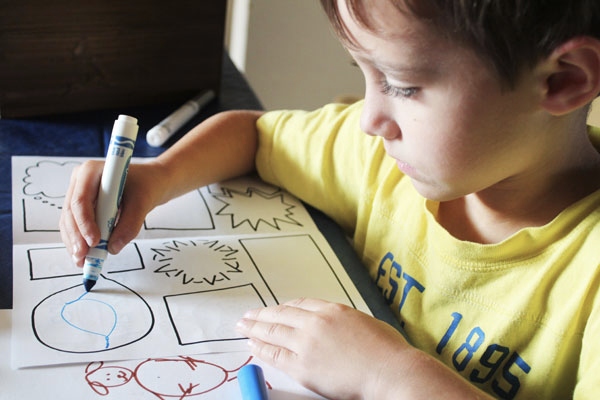
Creating a Comic Book allows children to dive into storytelling and art. Encourage preschoolers to create their comic strips, using a combination of drawings and text to tell a story. This activity blends creativity with literacy, teaching children about narrative structure, dialogue, and sequencing. It’s a fun and imaginative way to promote literacy for preschoolers, making it a standout choice among preschool language art activities.
11. Word Sort
Word Sort is a simple yet effective literacy preschool activity that helps children categorize words into different groups. You can use themes like animals, colors, or shapes. This activity encourages critical thinking as children decide on which category each word belongs to, enhancing their vocabulary and comprehension skills. It’s a hands-on way to explore language and is perfectly suited for literacy activities for 3-4 year olds.
Get started with these word sorting worksheets:
12. Letter of the Day
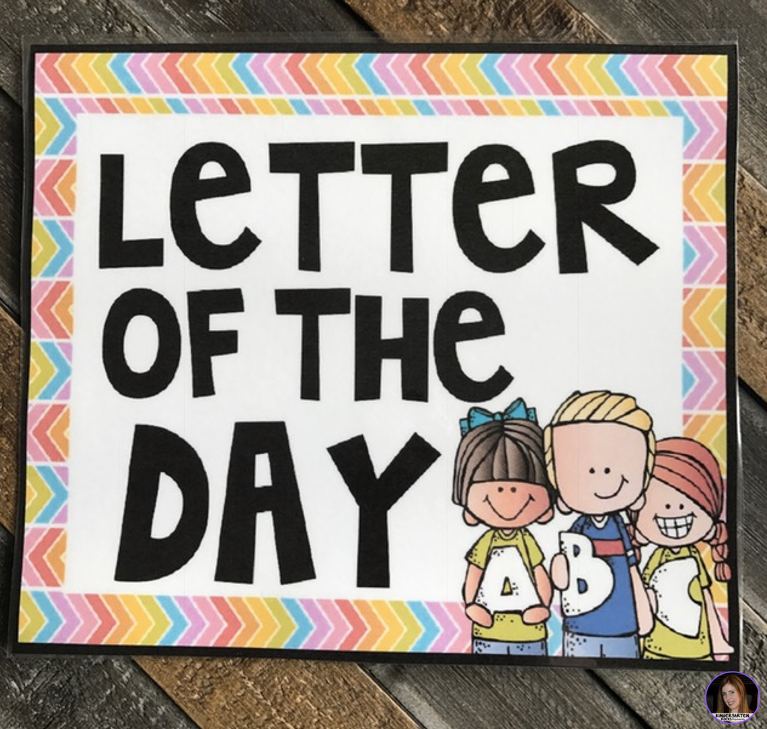
Focusing on a ‘Letter of the Day’ is a fantastic way to immerse preschoolers in the alphabet. Each day, choose a different letter and organize activities around it, such as identifying objects that start with that letter or practicing its sound. This approach keeps learning fresh and exciting, making it a cornerstone of literacy preschool activities.
Related Reading: How to Teach Alphabet to Kids
13. Cause and Effect Story Time
During Cause and Effect Story Time, read a story to the children and then discuss the events, focusing on the cause and effect within the narrative. This activity develops critical thinking and comprehension skills by encouraging children to think about why things happen in a story.
Test their understanding with these Cause and Effect worksheets:
14. “What Happens Next?” Stories
“What Happens Next?” Stories stimulate imagination and prediction skills. Pause a story at a pivotal moment and ask the children what they think will happen next. This activity encourages them to use clues from the story to make inferences about future events, fostering early analytical skills. It’s a dynamic method to engage with stories, making it a valuable part of literacy preschool activities.
Once your child has mastered prediction, you can start using these prediction worksheets to test their skills:
15. Making Connection in Reading Worksheet
This activity helps develop deeper comprehension skills as children learn to see connections between the text and the world around them. It’s an introspective and meaningful activity that supports the broader goals of literacy activities for 3-4 year olds.
Begin with these worksheets:
4 Benefits of Language and Literacy Activities for Preschoolers
1. Enhances Vocabulary and Language Skills: Engaging in literacy preschool activities helps children expand their vocabulary and improve their language skills. Through stories, games, and discussions, they learn new words and how to use them effectively in communication.
2. Boosts Phonemic Awareness: Literacy activities for 3-4 year olds are designed to enhance phonemic awareness. Activities like sound Jump and letter matching game help children recognize and manipulate sounds in words, a crucial skill for reading and spelling.
3. Encourages Creativity and Imagination: Language and literacy activities provide a platform for children to express themselves creatively. Whether it’s through storytelling, drawing, or playing pretend, these activities stimulate their imagination and encourage creative thinking.
4. Supports Cognitive Development: Participating in literacy activities from a young age supports overall cognitive development. Children learn to think critically, solve problems, and understand complex concepts through engaging and interactive learning experiences.
Conclusion
Engaging kids in language and literacy activities lays a strong foundation for their future learning and development. By incorporating these fun and educational literacy activities for preschoolers into their daily routine, you’re not only enhancing their literacy skills but also fostering a lifelong love for reading and learning.
Frequently Asked Questions (FAQs)
What are literacy skills for preschoolers?
Literacy skills for preschoolers include recognizing letters and sounds, understanding the basics of print (such as reading from left to right), beginning to write letters and their name, developing a vocabulary, and listening comprehension skills through stories and interactive reading.
How do you teach preschool literacy?
What activities encourage early literacy?
Activities like reading aloud, letter matching games, story sequencing, and interactive reading encourage early literacy by building foundational skills in a fun and engaging way.
What is an example of information literacy activities?
An example of information literacy activities includes teaching children how to find and use information from books or digital sources, such as using a simple online search with guidance or finding a book in the library on a specific topic.

















